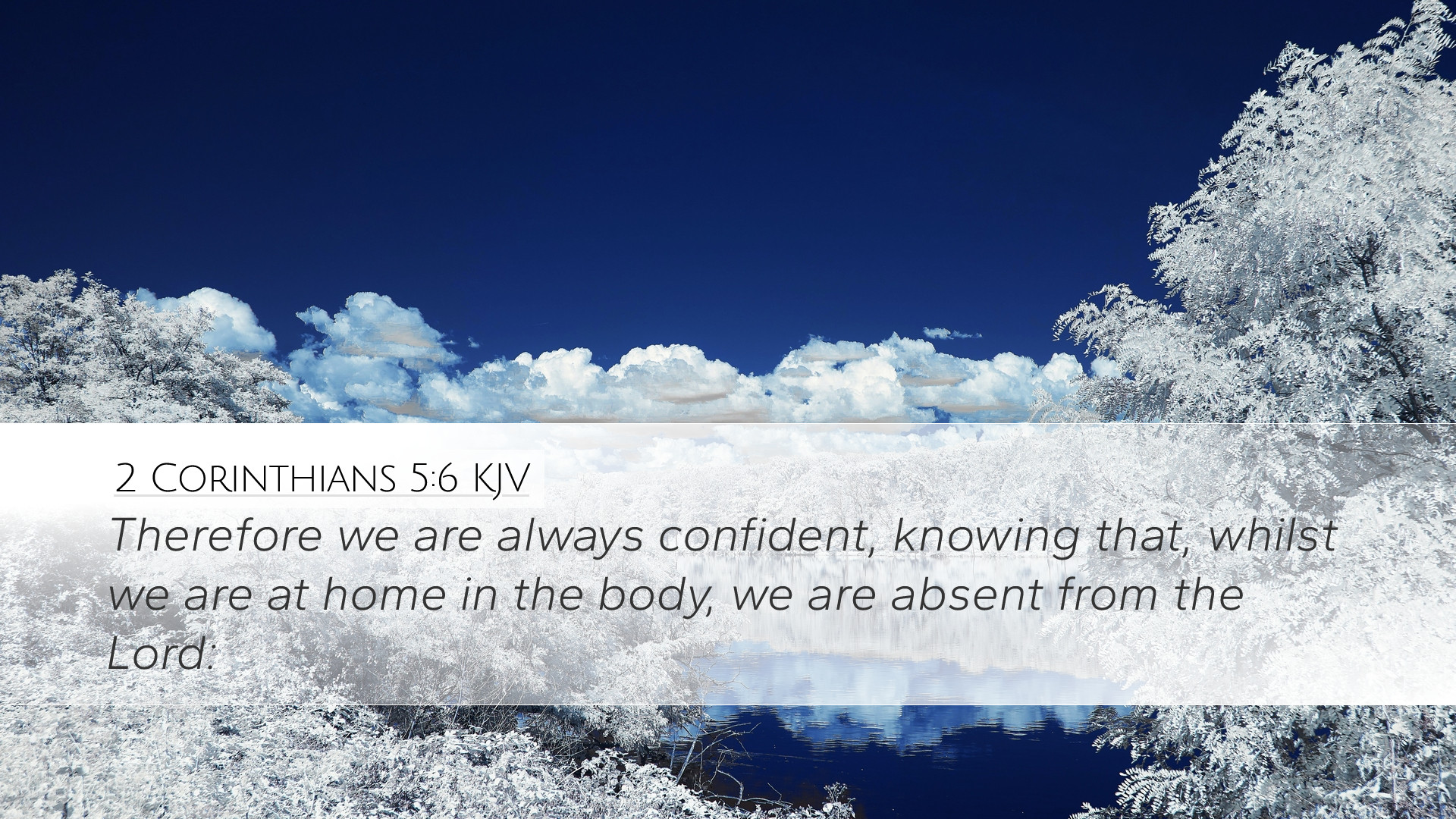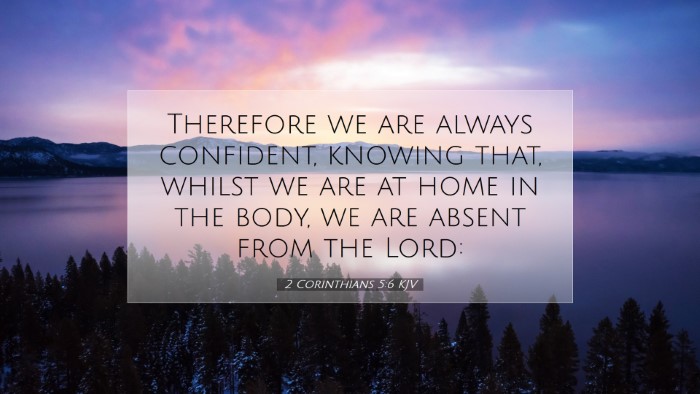Commentary on 2 Corinthians 5:6
Verse: "Therefore we are always confident, knowing that while we are at home in the body, we are absent from the Lord."
Introduction
This pivotal verse from 2 Corinthians encapsulates a profound theological reflection on the believer's existence in the body versus their eternal union with God. It addresses the tension between the temporal physical realm and the eternal spiritual reality, a theme prevalent throughout Paul's epistles. By drawing insights from Matthew Henry, Albert Barnes, and Adam Clarke, we can gain a comprehensive understanding of this text.
Exegesis of the Text
In this verse, Paul transitions from discussing the earthly tent (the body) to the confidence believers should possess regarding their future in Christ. The confidence Paul speaks of is rooted in the assurance of faith and the understanding of the believer's dual existence: one in the flesh and one anticipated in the presence of God.
Matthew Henry's Insights
Matthew Henry emphasizes the believers' confidence in their spiritual journey. He notes that while Christians dwell in their earthly bodies, they recognize this as a temporary condition. Their confidence stems from a firm belief in the promise of wholeness in God's presence, which is yet to come. Henry articulates this by stating:
"While we are at home in the body, we are absent from the Lord; but we are assured, that though in the body, we carry the loyalty to Christ within us."
Albert Barnes' Perspective
Albert Barnes elaborates on the implications of being "absent from the Lord." He interprets this as a spiritual longing for communion with God, which is anticipated but currently unfulfilled. Barnes posits that this absence is not one of neglect but a condition of the believer’s earthly sojourn:
"The phrase here implies a deep desire for that state of existence where believers will enjoy full communion with God. The confidence that Paul speaks of, is based upon the hope of this anticipated communion."
Moreover, Barnes expounds on the necessity of this confidence, indicating that it provides the believer with joy amid suffering and trials that characterize life in a fallen world.
Adam Clarke's Commentary
In contrast, Adam Clarke provides a more personal reflection on the matter of confidence. He discusses the judgment faced by all believers when they leave their earthly bodies. Clarke discusses the implications of this judgment, urging Christians to maintain a peaceful assurance as they live out their days in the mortal coil:
"Being confident in the face of the potential judgment is essential. When we are in the body, we are to be diligent in pleasing God, for we shall soon leave this earthly state and stand before Him."
Theological Implications
This commentary on 2 Corinthians 5:6 reveals significant theological implications. It highlights the importance of eschatology—understanding the ‘already but not yet’ tension of believers’ lives. Thus, believers navigate a world filled with hardships but carry a future hope that transcends earthly struggles.
- Dual Nature of Existence: The verse underscores the contrast between earthly life and the spiritual reality to come.
- Assurance and Confidence: The promise of God's presence provides believers with comfort and motivation to live righteously.
- Expectation of Judgment: Acknowledging the forthcoming judgment influences how believers live today.
Practical Application
For pastors, students, and theologians, this verse serves as a profound reminder to cultivate confidence in God amidst earthly challenges. It encourages a life lived in anticipation of eternal joy with God, prompting self-evaluation regarding one's daily actions and motivations.
- Encouragement in Suffering: Use this verse to comfort congregants facing trials.
- Motivation for Evangelism: Highlight the necessity for others to find hope and assurance in Christ.
- Personal Reflection: Encourage self-examination regarding one’s relationship with God and the ultimate hope of eternal life.
Conclusion
2 Corinthians 5:6 invites believers to reflect on their spiritual journeys, reinforcing the confidence that shapes their existence while in the body. The combination of insights from Henry, Barnes, and Clarke enriches our understanding, providing a multi-faceted approach to living in light of God’s promises. The confidence outlined here is not merely a psychological state, but a deep-seated assurance that originates in faith, nourishing the believer's spirit as they navigate the earthly realm.


